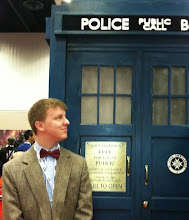I like time travel movies for the same reason I like mysteries. They’re essentially a puzzle to construct and to partake in. The act of moving backwards or forwards in time means everything must be perfectly situated. Within this riddle there plenty of different options and rules to explore.
There is the idea of “whatever happened, happened;” a phrase coined by the show LOST. With this mythology, there is only one timeline. It’s impossible to go back in time and kill Hitler because it didn’t happen. It’s impossible to change the past, only the future. There is a Spanish film called Timecrimes that really follows this delicately. In this movie Héctor is just an innocent bystander who happens to find a time machine in his neighbor’s house. In an attempt to fix his day, he ends up causing all of the turmoil he’s trying to correct. This same thing is seen in Harry Potter and the Prisoner of Azkaban. Before Harry goes back in time he looks across the pond and he thinks he sees the ghost of his father. Ultimately it is all the same timeline and it is him standing across the pond inspiring himself to cast the spell. Without spoiling anything La Jetée/Twelve Monkeys also follows this.
I find this tactic to be underwhelming. Once it’s established that nothing can be changed all of the stakes of the movie are diminished. It worked in Harry Potter because the time travel is such a small portion of the plot. I like it in movies when things can still be changed. The most popular example is the Back to the Future films. There Marty McFly goes to various portions of history and changes things. He is aware of the butterfly effect—the idea that if a butterfly flaps its wings in South America that inspires a chain of events to cause a hurricane across the country. So he’s aware of what could be changed, but since Marty is young and stupid he still ends up changing his present. The major aspect of this version of time travel that doesn’t make sense. The idea of the fading pictures randomly really only serves the plot, not logic.
One of the easiest ways to do time travel is not to go to the past. The original Planet of the Apes is a perfect example of this. It plays with the differences of culture and having the stranger in a strange land. As the series goes on it becomes more convoluted and plays with both aspects of time travel: can they or can’t they change things. I can’t speak much for the new Planet of the Apes movie because frankly I’m pretty sure that one doesn’t make sense. A better example of this is the first two Terminator movies, which fulfills both of them with ease. When dealing with time travel it’s too easy to focus on the plot and rush through characters, but the Terminator films really do a great job with balancing both. Sadly the next two movies really ruin the aspects that made the original set so strong.
I appear to be simplifying this genre by separating into these categories. What I really like about it is the possibly to continue exploring more aspects. The revamped Doctor Who series has shown the loneliness. Primer gave an amazing look at it with a complicated realistic slant. Also we have movies like Hot Tub Time Machine, which knows not to take it seriously and just have fun with the absurdity. It’s come to the point where it’s no longer nerdy to enjoy time travel movies. Right?
http://www.thefilmyap.com/2010/03/27/forward-into-the-past/


No comments:
Post a Comment